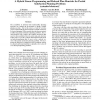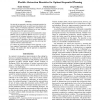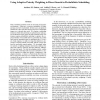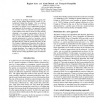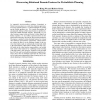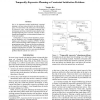123
click to vote
AIPS
2007
15 years 5 months ago
2007
Autonomous systems operating in real-world environments must be able to plan, schedule, and execute missions while robustly adapting to uncertainty and disturbances. Previous work...
AIPS
2007
15 years 5 months ago
2007
140
click to vote
AIPS
2007
15 years 5 months ago
2007
This paper summarizes research on a new emerging framework for learning to plan using the Markov decision process model (MDP). In this paradigm, two approaches to learning to plan...
AIPS
2007
15 years 5 months ago
2007
124
click to vote
AIPS
2007
15 years 5 months ago
2007
A great deal of research has addressed the problem of generating optimal plans, but these plans are of limited use in circumstances where noisy sensors, unanticipated exogenous ac...
104
click to vote
AIPS
2007
15 years 5 months ago
2007
Many scheduling problems reside in uncertain and dynamic environments – tasks have a nonzero probability of failure and may need to be rescheduled. In these cases, an optimized ...
124
click to vote
AIPS
2007
15 years 5 months ago
2007
We consider the problem of finding an n-agent jointpolicy for the optimal finite-horizon control of a decentralized Pomdp (Dec-Pomdp). This is a problem of very high complexity ...
116
Voted
AIPS
2007
15 years 5 months ago
2007
In sequential decision-making problems formulated as Markov decision processes, state-value function approximation using domain features is a critical technique for scaling up the...
128
Voted
AIPS
2007
15 years 5 months ago
2007
Due to its important practical applications, temporal planning is of great research interest in artificial intelligence. Yet most of the work in this area so far is limited in at...

